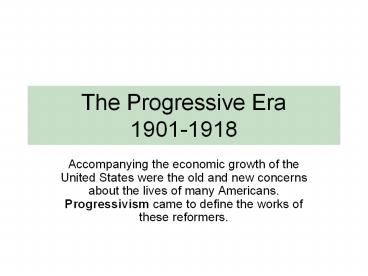The Progressive Era 1901-1918 - PowerPoint PPT Presentation
1 / 22
Title:
The Progressive Era 1901-1918
Description:
The Progressive Era 1901-1918 Accompanying the economic growth of the United States were the old and new concerns about the lives of many Americans. – PowerPoint PPT presentation
Number of Views:256
Avg rating:3.0/5.0
Title: The Progressive Era 1901-1918
1
The Progressive Era1901-1918
- Accompanying the economic growth of the United
States were the old and new concerns about the
lives of many Americans. Progressivism came to
define the works of these reformers.
2
Origins of Progressivism
- State reforms of the late 1800s (Greenback and
Populist Party) - Industrialization, immigration and urbanization
- Middle class Americans felt a need to adjust to
changing times - Lasts through the administrations of President
Roosevelt, Taft and Wilson (1901-1917) - Ends with U.S. entry into WWI
3
Attitudes and Motives
- Once a rural population of farmers, now fast
becoming industrialized with mixed ethnicities - Middle class alarmed by power of big businesses
and gap between rich and poor - African-American plight in the South
- Womens suffrage
- Progressives were diverse Protestant church
leaders, African-Ams., labor leaders, women - CHANGE is needed!
4
Who were the Progressives?
- Mostly middle class and urban dwellers
- This social class had steadily grown in the late
19th century - White collar office holders along with lawyers,
ministers and shopkeepers - Worried about America and what could happen to
democracy unrest among the poor, excesses of
rich and corruption in government - Social Gospel
5
What was the Progressives philosophy?
- Reform impulse was hardly new
- They way people thought and reasoned was
challenged - Charles Darwin
- People should take a pragmatic or practical
approach to morals, ideals and knowledge not a
fixed/changeless approach - Experiment with new laws and ideas More
Democracy! - Govt. as agency of human welfare
6
The Muckrakers
- Before the public took action, it had to be well
informed - Newspapers and magazines published investigative
stories - T. Roosevelt called these reporters muckrakers
- Photojournalist Jacob Riis published How the
Other Half Lives (1890)
7
The Muckrakers
8
The Muckrakers
- Upton Sinclairs The Jungle, exposed the
conditions of the meatpacking industry - Lincoln Steffens The Shame of The Cities,
described in detail the corrupt deals that
characterized big city politics - Muckraking exposed inequities and educated the
public - Sensationalism tended to get out of hand
- Declines after 1910
9
Voter Participation
- The cornerstone of Progressive ideology was
democracy - Advocated reforms to increase voter participation
- Secret ballot
- Direct primaries
- Direct election of senators (17th Amendment
1913) - Initiative
- Referendum
- Recall
10
Theodore Roosevelts Square Deal
- TR believed the president should do more - set
legislative agenda for Congress - Activist, reform minded president
- Square Deal for all (labor and business)
- Trust-busting bad trusts and good trusts
- Directed his attorney general to take antitrust
action against Standard Oil
11
Theodore Roosevelts Square Deal
- Enforced the Sherman Antitrust Act
- Strengthened the Interstate Commerce Commission
- After Upton Sinclairs book the Jungle, Congress
passed two regulatory laws - 1.) The Pure Food and Drug Act
- 2.) The Meat inspection Act
12
(No Transcript)
13
Theodore Roosevelts Square Deal
- Conservationist
- Perhaps his most lasting and original domestic
policy was his efforts to protect our natural
resources - Set aside 150 million acres of federal land to be
protected - White House Conference, established a National
Conservation Commission - U.S. Forest Service
- TR increased power and prestige of presidency
14
William Howard Taft
- Roosevelt stepped down and Republican Party
nominated Taft - Taft will continue TRs Progressive policies
trustbusting and conservation - 16th Amendment (1913) authorized U.S. government
to collect an income tax (Populist platform in
1892) - Foreign policy dollar diplomacy
15
Socialist Party
- Third party developed in first decade of 1900s,
dedicated to welfare of working class - Called for more radical reforms then the
Progressives - Eugene V. Debs, was the partys candidate in five
elections - Critic of business and champion of labor (Pullman
strike) - Seen by many as too radical
- In 1912 Debs received 900,000 votes 6 of total
16
Election of 1912
- Taft renominated by Republicans
- Progressive (Bull Moose party) nominated T.
Roosevelt - Democrats nominated Woodrow Wilson
- Came down to Roosevelt vs. Wilson
- Roosevelt called for New Nationalism
- Wilson pledges a New Freedom
17
Election of 1912
- Republicans voters split their vote (Taft and
Roosevelt) - Wilson wins!
- Like Roosevelt he believed a president should
lead Congress and appeal directly to the people
for support - He pledged to bring back fair competition in the
economy - Fought against the triple wall of privilege -
tariffs, banking and trusts
18
(No Transcript)
19
Woodrow WilsonsNew Freedom
- Clayton Antitrust Act strengthened the Sherman
Antitrust Act - Federal Trade Commission investigated unfair
trade practice - Federal Farm Loan Act loans with low interest
rates - Child Labor Act on interstate commerce products
- Underwood Tariff Bill reduced tariff rates
20
African-Americans in the Progressive Era
21
African-Americans in the Progressive Era
- Largely ignored by Progressive presidents
- Thousands lynched by racist mobs
- Segregation still widespread
- At turn of the century, roughly 9 out of 10
blacks lived in the South - Population begins shifting North
- Jobs in northern cities
- During both World Wars the migration will increase
22
Women, Suffrage and the Progressive Movement
- Anthony and Stanton passed the torch to next
generation - At first Wilson refused to support a national
amendment, until late in his presidency - NAWSA- Carrie Chapman Catt
- Nineteenth Amendment passed in 1920































